陕西省神木县大保当中学九年级英语 unit 12 You’re supposed to shake hands period 5教案 人教新目标版
- 格式:doc
- 大小:113.00 KB
- 文档页数:2
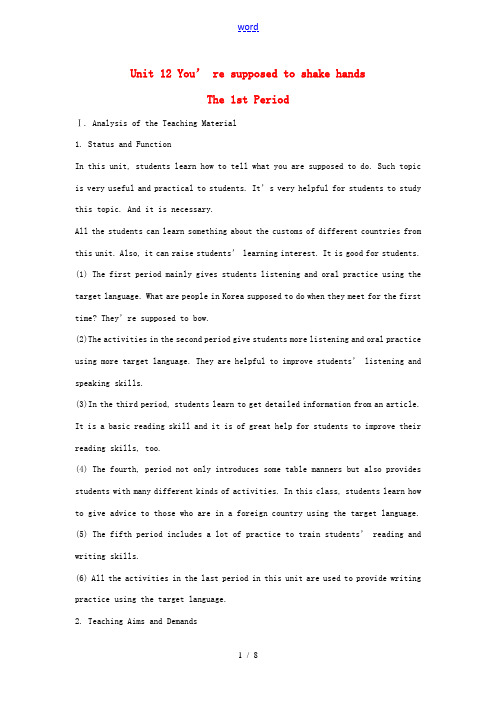
Unit 12 You’ re supposed to shake handsThe 1st PeriodⅠ. Analysis of the Teaching Material1. Status and FunctionIn this unit, students learn how to tell what you are supposed to do. Such topic is very useful and practical to students. It’s very helpful for students to study this topic. And it is necessary.All the students can learn something about the customs of different countries from this unit. Also, it can raise students’learning interest. It is good for students.(1) The first period mainly gives students listening and oral practice using the target language. What are people in Korea supposed to do when they meet for the first time? They’re supposed to bow.(2)The activities in the second period give students more listening and oral practice using more target language. They are helpful to improve students’ listening and speaking skills.(3)In the third period, students learn to get detailed information from an article. It is a basic reading skill and it is of great help for students to improve their reading skills, too.(4) The fourth, period not only introduces some table manners but also provides students with many different kinds of activities. In this class, students learn how to give advice to those who are in a foreign country using the target language.(5) The fifth period includes a lot of practice to train students’ reading and writing skills.(6) All the activities in the last period in this unit are used to provide writing practice using the target language.2. Teaching Aims and Demands(1) Knowledge ObjectsIn this unit, students learn how to tell what you are supposed to do and how to give advice to those who are in a foreign country.(2) Ability ObjectsTo train students’listening, speaking, reading and writing skills using the target language.(3) Moral ObjectsDifferent countries have different customs. So we are supposed to do in Rome as the Romans do.3. Teaching Key PointTo make students learn and grasp the key vocabulary words and the target language.4. Teaching Difficult PointsTo train students’ listening, speaking, reading and writing skills.To train students’ municative petence.5. Studying WayTeach students how to be a polite guest.Ⅱ. Language FunctionTell what you are supposed to do.Ⅲ. Target LanguageHow was the dinner at Paul’s house last night?Well, it was OK, but I made some mistakes. I was supposed to arrive at 7:00, but I arrived at 8:00.Ⅳ. StructureSupposed toⅤ. Vocabulary1. kiss, bow, table manners, chopstick, fork, spoon, napkin, greet, rude, wipe, point, stick2. shake hands, be supposed to, drop by, pick up3. You should…Ⅵ. Recycling1. loudly, softly, polite, knife, custom, country, Brazil, the United States, Japan, Mexico, wrong2. on timeⅦ. Learning Strategies1. paring2. Listening for key wordsⅧ. Teaching TimeSeven periodsThe First PeriodⅠ. Teaching Aims and Demands1. Knowledge Objects(1)Key Vocabularybow, kiss, be supposed to, shake hands, customs(2) Target’ LanguageWhat are people in Korea supposed to do when they meet for the first time? They’re supposed to bow.2. Ability Objects(1)Train students’ listening ability.(2)Train students’ municative petence.3. Moral ObjectsBefore you meet foreigners, you should some customs. In this way, you can act politely and properly.Ⅱ. Teaching Key PointsTarget languageⅢ. Teaching Difficult Points1. How to train students’ listening ability.2. How to train students’ municative petence.Ⅳ. Teaching Methods1. Scene teaching method2. Listening-and-answering activity to help the students go through with the listening material.Ⅴ. Teaching Aids1. A tape recorder2. A map of the worldⅥ. Teaching ProceduresStep Ⅰ RevisionT: Yesterday we finished Unit 11. In this unit, we learned some ways of asking for information politely. Now if you want to go to a library to get a book, how can you ask?S1: Do you know where I can get a book?S2: Could you tell me how to get to the library?S3: Can you please tell me where I can buy a book?T: Very good. You’re right. From today on, we’ll learn Unit 12.Write the two column headings on the board: Right and Wrong.Say, Please tell me things that are good to do in school and that are not good to do in school.Write each suggestion under the appropriate heading on the board.T: Is it a good idea to e to class late?S1: No.T: That’s right, It’s not a good idea to e to class late. You’re not supposed to e to class late. Class repeat. You’re not supposed to e to class late.S s: You’re not supposed to e to class late.T: (Writes e to class late under wrong) What are some things you shouldn’t do? S2: We shouldn’t eat in class.T: Right. You’re not supposed to eat in class.Ask students to repeat this example.Then ask students to tell about some things that are good to do in school. They may say things such as, You should do your homework every day; You should raise your hand before you talk. Rephrase each of these sentences using supposed to and ask students to repeat: You’re supposed to do your homework every day.You’re supposed to raise your hand before you talk.Step Ⅱ1aThis activity introduces some target language.Let students read the instructions.Point to the two lists of words. Read each word and ask students to repeat it. Put up a map of the world on the board.Ask students to explain where each of the countries is.Suggested answers1. Brazil is in South America, next to Peru.2. The United States is in North America, next to Canada.3. Japan is in East Asia, to the east of China,4. Mexico is in North America, on the south of America.5. Korea is in East Asia, It is our neighbor.Ask different students to act out the action described by each word or phrase—bow, shake hands, and kiss.Read the instructions again and ask students to match the customs lettered a, b and c with the numbered countries.Look at the sample answer. Tall students to guess if they aren’t sure.Answers1. c2. b3. a4. b5. aStep Ⅲ 1bThis activity gives students practice understanding the target language in spoken conversation.Go through the instructions with the class. Point to the lists in Activity la and say, Now you will hear a conversation between a boy and a girl. Their conversation contains the answers to the questions inActivity 1a.Play the tape for the first time. This time, students only listen.Play the tape a second time. Ask them to listen to the recording and check their answers to Activity 1a.Check the answers with the class. Invite a student to read the answers. Answers1. c2. b3. a4. b5. aTapescriptBoy 1: What are people supposed to do when they meet in your country, Celia? Girl 1: Well, do you mean when friends meet for the first time?Boy 1: Yeah.Girl 1: Well, in Brazil, friends kiss.Boy 1: What about in Mexico, Rodriguez?Boy 2: In Mexico we shake hands.Boy 1: How about in Japan, Yashi?Boy 3: We bow.Girl 2: And in Korea we also bow.Boy 1: Well, I guess in most Western countries we shake hands.Step Ⅳ1cThis activity provides guided oral practice using the target language.Read the instructions to the whole class.Point out the example in the box. Ask two students to read it to the class.S A: What are people in Korea supposed to do when they meet for the first time? S B: They’re supposed to bow.Point to the lists of customs and countries in Activity la. Tell students to first talk about these countries and customs, and then talk about other countries and customs they know about.As students work together, move around the classroom checking their work.Ask different pairs of students to ask and answer a question for the class.S1: What are people in the United States supposed to do when they meet for the first time?S2: They’re supposed to shake hands.S3: What are people in Japan supposed to do when they meet for the first time? S4: They’re supposed to bow.S5: What are people in France supposed to do when they meet for the first time? S6: They’re supposed to shake hands.Step Ⅴ SummaryIn this class, we’ve learned some important words, such as bow, kiss, be supposed to, shake hands. We’ve also learned the target language What are people in Korea supposed to do when they meet for the first time? They’re supposed to bow. Step Ⅵ HomeworkReview the target language.Step Ⅶ Blackboard Design。
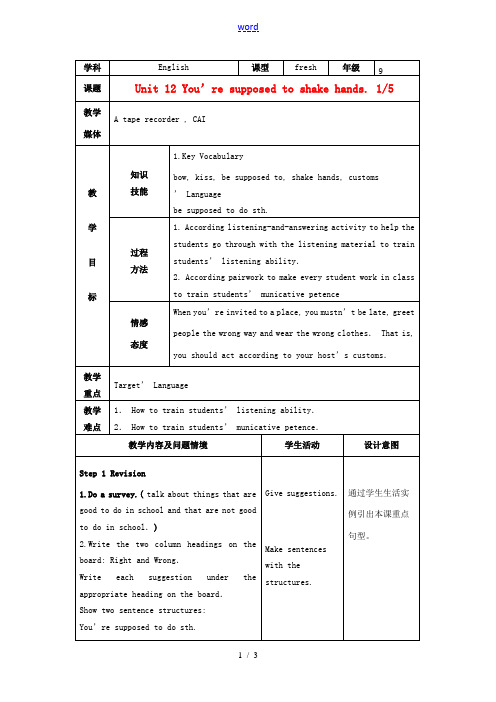
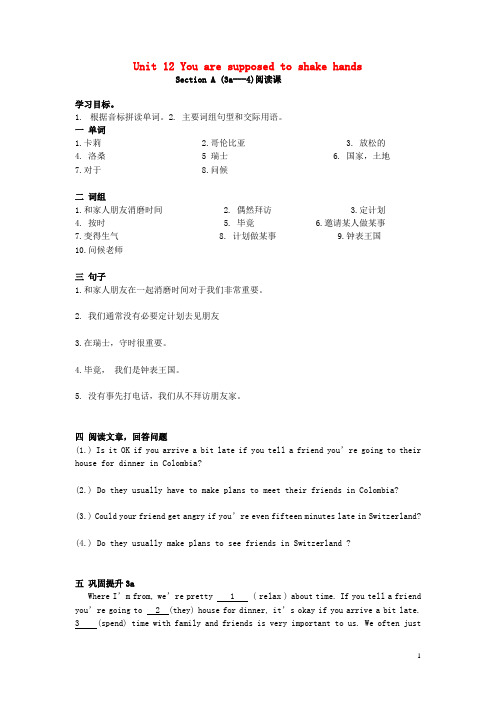
Unit 12 You are supposed to shake handsSection A (3a---4)阅读课学习目标。
1.根据音标拼读单词。
2. 主要词组句型和交际用语。
一单词1.卡莉2.哥伦比亚3. 放松的4. 洛桑 5 瑞士 6. 国家,土地7.对于 8.问候二词组1.和家人朋友消磨时间2. 偶然拜访3.定计划4. 按时5. 毕竟6.邀请某人做某事7.变得生气 8. 计划做某事 9.钟表王国10.问候老师三句子1.和家人朋友在一起消磨时间对于我们非常重要。
2. 我们通常没有必要定计划去见朋友3.在瑞士,守时很重要。
4.毕竟,我们是钟表王国。
5. 没有事先打电话,我们从不拜访朋友家。
四阅读文章,回答问题(1.) Is it OK if you arrive a bit late if you tell a friend you’re going to their house for dinner in Colombia?(2.) Do they usually have to make plans to meet their friends in Colombia?(3.) C ould your friend get angry if you’re even fifteen minutes late in Switzerland?(4.) Do they usually make plans to see friends in Switzerland ?五巩固提升3aWhere I’m from, we’re pretty 1 ( relax ) about time. If you tell a friend you’re going to 2 (they) house for dinner, it’s okay if you arrive a bit late.3 (spend) time with family and friends is very important to us. We often justdrop by our 4 (friend) homes. We don’t usually have to make plans 5 (meet) our friends. Often we just walk around the town center, 6 (see) as many of our friends as we can!In Switzerland, it’s very important 7 (be) on time. We’re the land of 8 (watch), after all! If someone invites you 9 (meet) them at 4:00, you have to be there at 4:00. If you’re even fifteen minutes late, your friend may get angry. Also, we never visit a friend’s house without 10 (call) first. We usually make plans to see friends. We usually plan to do something interesting, or go somewhere together.六用所给词的适当形式填空。
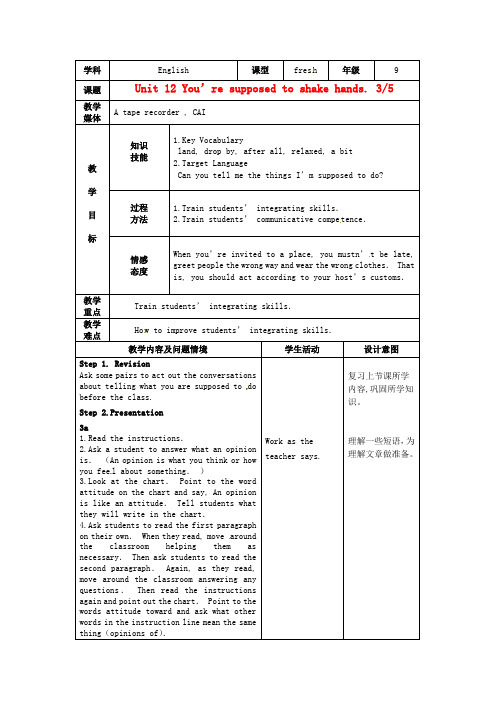
学科English 课型fres h 年级9课题Unit 12 You’re supposed to shake hands. 3/5 教学媒体A tape recorder , CAI教学目标知识技能1.Key Vocabularyland, drop by, after all, relaxed, a bit2.Target LanguageCan you tell me the things I’m supposed to do?过程方法1.Train students’ integrating skills.2.Train students’ communicative compe tence.情感态度When you’re invited to a place, you mustn’t be late,greet people the wrong way and wear the wrong clothes. Thatis, you should act according to your host’s customs.教学重点Train students’ integrating skills.教学难点Ho w to improve students’ integrating skills.教学内容及问题情境学生活动设计意图Step 1. RevisionAsk some pairs to act out the conversationsabout telling what you are supposed to dobefore the class.Step 2.Presentation3a1.Read the instructions.2.Ask a student to answer what an opinion is.(An opinion is what you think or how you fee l about something.)3.Look at the chart. Point to the word attitude on the chart and say, An opinion is like an attitude. Tell students what they will write in the chart.4.Ask students to read the first paragraph on their own. When they read, move around the classroom helping them as necessary. Then ask students to read the second paragraph. Again, as they read, move around the classroom answering any questions.Then read the instructions again and point out the chart. Point to the words attitude toward and ask what other words in the instruction line mean the same thing(opinions of).Work as theteacher says.复习上节课所学内容,巩固所学知识。
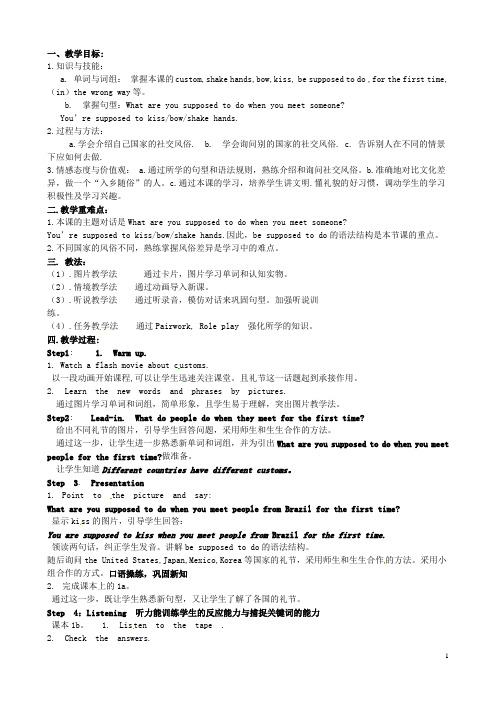
一、教学目标:1.知识与技能:a. 单词与词组:掌握本课的custom,shake hands,bow,kiss, be supposed to do ,for the first time, (in)the wrong way等。
b. 掌握句型:What are you supposed to do when you meet someone?You’re supposed to kiss/bow/shake hands.2.过程与方法:a.学会介绍自己国家的社交风俗.b. 学会询问别的国家的社交风俗.c. 告诉别人在不同的情景下应如何去做.3.情感态度与价值观: a.通过所学的句型和语法规则,熟练介绍和询问社交风俗。
b.准确地对比文化差异,做一个“入乡随俗”的人。
c.通过本课的学习,培养学生讲文明.懂礼貌的好习惯,调动学生的学习积极性及学习兴趣。
二.教学重难点:1.本课的主题对话是What are you supposed to do when you meet someone?You’re supposed to kiss/bow/shake hands.因此,be supposed to do的语法结构是本节课的重点。
2.不同国家的风俗不同,熟练掌握风俗差异是学习中的难点。
三. 教法:(1).图片教学法通过卡片,图片学习单词和认知实物。
(2).情境教学法通过动画导入新课。
(3).听说教学法通过听录音,模仿对话来巩固句型。
加强听说训练。
(4).任务教学法通过Pairwork,Role play 强化所学的知识。
四.教学过程:Step1: 1. Warm up.1. Watch a flash movie about c ustoms.以一段动画开始课程,可以让学生迅速关注课堂。
且礼节这一话题起到承接作用。
2. Learn the new words and phrases by pictures.通过图片学习单词和词组,简单形象,且学生易于理解,突出图片教学法。

九年级英语Unit12 You ’re supposed to shake hands 教案Part 1: Teaching design (第一部分:教学设计)Goals●To learn to use the structure Supposed to + infinitive●To listen and talk about what people are supposed to doProceduresWarming up by learning about the structure Supposed to + infinitiveTurn to page 95 first. Look at the sentences. Do you see how the structure Supposed to + infinitive is used?1a Looking, listening and matchingHello, class. What are we supposed to do next? Yes, you are right. We are going to look, listen and match. Now turn to page 94. Look at the picture and listen to the recording for what people do when they meet for the first time.1b Listening and checkingYou are supposed to listen for a second time to check your answers in 1a.Now you can turn to page 135 to read the tapescript. Whilereadingcircle the connectives and underline the expressions.1c Doing pairworkWhat do people do when they meet for the first time? Now inpairs telleach other what you know about meeting for the first time. You are sopposed to use the Supposed to+ infinitive structure, OK?2a Listening and checkingMaria, an exchange student from India, went to her AmericanFriend Dan’s place an d had dinner there. Now listen to the tapefor the mistakes Maria made there.Now you may check√the mistakes by Maria on page 95.2b Listening and fillingTo fill in the blanks on page 95 you are supposed to listen to thetape one more time.Next you are supposed to make a conversation based on 2b. You are supposed to say anything you like.2c Doing pairworkYou are supposed to role play the conversation between Mariaand Dan. And you are supposed to use the information fromactivities 2a and 2b.3a Reading and fillingOn page 96 are two exchange students, one from Colombia, the other from Switzerland, talking about their own home culture. Now read their speech, blacken the connectives and underline the expressions.And now you are supposed to fill in the chart.3b Doing pairworkNext you are supposed to role play a conversation between Teresa and Marc, telling about the different attitudes of life in their home countries.4 Doing pairworkAn exchange student from England is coming to your school for classes. You are supposed to fill in the chart below on page 96 with things he is supposed to do inside and outside the classroom.Now you are supposed to role play a conversation based on the chart you just filled in.Closing down by competingTo end this English class you are supposed to take acompetition. You are supposed to say as many sentences withthe Structure: Supposed to+ infinitive as possible. Now go ahead in pairs. The winner will be given a big, wonderful gift.。
Unit 12 You are supposed to shake handsSelf check复习课学习目标:1.根据音标拼读单词。
2. 主要词组和句型。
3. 谈论餐桌礼仪。
学习重难点。
1.重点词组和句型。
2. 谈论餐桌礼仪。
一单词1.不熟悉的2.调羹3.刀,餐刀4. 挤满二词组1.使某人感到宾至如归。
2对某人来说不熟悉。
3习惯某事4.敬酒 5约会 6 称赞7.特别做某事三句子1.感谢你邀请我参加你的生日聚会。
2.所有的问题都涌入了我的头脑中3.正如你所想象的那样,情况与我们国内不一样。
4.他去朋友家之前,会先打一个电话。
5.这些餐桌礼仪你有必要了解。
四单项选择1.Don’t make __________! I’m doing my homework.A. soundB. voiceC.noise.D. sounds2.The little girl pointed _______ the bird in the tree.A. onB. intoC. atD. for3.Look out! The cup is _______ hot water.A full of B. fill with C. full D. fill4.He found _______ very interesting to ride a horse on the farm.A. thisB. thatC. it D .who5.Buses ______ passengers.A. are used to carryingB. are used to carryC. used to carryD. get used to carry五书面表达Chinese Table manners。